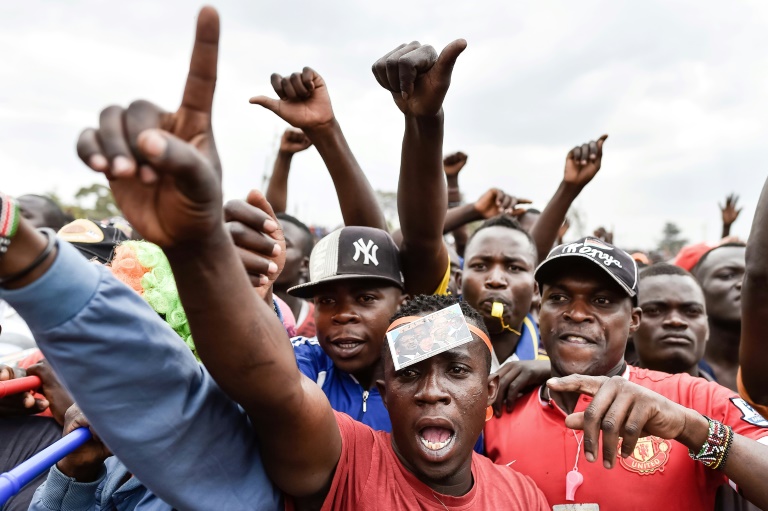Western nations on Monday warned starkly of Kenya's 'deteriorating political environment' ahead of a presidential election re-run, urging the major parties to halt incitement and verbal attacks on institutions.
US Ambassador Robert Godec said that if the electoral commission felt it was not ready for Thursday’s poll, it should ask the courts for a delay.
“We would be fine with that,” he said.
But with the election commission pushing ahead and both President Uhuru Kenyatta and opposition leader Raila Odinga digging in, it looks as if a vote will go ahead — but without Odinga, who withdrew his candidacy earlier this month.
Godec read a statement from 20 Western envoys, including the 28-nation European Union, calling for political rivals to unite to allow a credible election to take place, after weeks of political drama that has gripped and divided the nation.
Foreign powers are deeply worried for Kenya has a history of political violence that, at its worst a decade ago, left over 1,100 dead.
Kenyans on Thursday are due to hold their second presidential election this year, after the Supreme Court overturned the results of an August 8 vote citing “irregularities and illegalities”.
The ruling was a rare victory for veteran opposition leader Raila Odinga, who has since refused to take part in the re-run, accusing the Independent Electoral and Boundaries Commission (IEBC) of failing to make required reforms.
He has called for mass protests on election day, and wrote on Twitter that his supporters would picket outside IEBC offices on Tuesday and Wednesday, demonstrations banned by the government.
– Deep divisions –
Despite the envoys’ pleas, the two sides appear more deeply divided than ever.
The National Super Alliance (NASA) opposition coalition on Monday reiterated that it would not participate in Thursday’s vote.
“Our position is final that we do not recognise the election scheduled for October 26 and we shall not participate in it because it doesn’t serve the country’s interest,” said NASA chairman Musalia Mudavadi.
Meanwhile, after meeting with IEBC chairman Wafula Chebukati, Kenyatta said the election must go ahead.
“We made clear that we have no demands or conditions on this subject. We have made funds available for the IEBC to do its job. Now they really should deliver,” he said.
The bad blood between the sides was underscored Monday by the charging of Ruth Odinga, the opposition leader’s sister, accused of damaging IEBC property and inciting violence.
In their statement the diplomats slammed incidents in which poll officials have been attacked and their training interrupted by opposition protesters.
“Attacks on IEBC staff must cease now. No one is obliged to stand for office, or to vote if they do not wish to,” said Godec.
“But no one should use violence or intimidation to disrupt the right of others to vote or to participate. Doing so is profoundly undemocratic, and leaders must tell their supporters to refrain from such actions.”
He said the diplomatic community has been working to encourage Odinga to rejoin the election and, despite all signs to the contrary, continues “to hope they will do so in light of the progress made at the IEBC.”
– Reform row –
While the IEBC has not conceded to several major demands from Odinga, such as the firing of certain staff, and a change in providers of ballot papers and election technology, Godec said they had made several important changes.
But he also said attempts by the ruling party to change certain electoral laws ahead of the re-run were “unhelpful” and urged Kenyatta not to sign the amendments.
“Unfortunately, the deteriorating political environment is undermining preparations for the new presidential election,” Godec said, in the statement issued in the name of the 20 envoys.

Odinga enjoys fervent support in parts of the country. He has pulled out of the election race, saying Kenya’s election board is so problem-riddled that the vote cannot be credible
“Inflammatory rhetoric, attacks on institutions, and growing insecurity all make holding a credible and fair poll more difficult… it is dangerous, and it must stop.”
Speaking Monday, Kenya’s security minister, Fred Matiangi, said police and security forces would ensure “a very peaceful election” on Thursday.
The envoys’ statement was endorsed by Australia, Austria, Belgium, Britain, the Czech Republic, Denmark, the European Union, Finland, France, Germany, Ireland, Italy, Netherlands, Norway, Portugal, Slovakia, Spain, Sweden, Switzerland and the United States.
With just days to go before the scheduled vote the IEBC has suffered a series of upheavals.
Last week one of its seven commissioners, Roselyn Akombe, fled the country and quit, saying the election could not be credible. Chebukati afterwards warned he could not guarantee a free and fair poll, while the body’s controversial chief executive, Ezra Chiloba, suddenly went on three weeks’ leave.
Nevertheless, the IEBC has insisted it is ready to conduct the vote.
Download our app